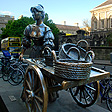ST
AUDOEN’S CHURCH
Dublin’s Oldest Medieval Church
 The Church of St Audoen’s on the north side of Dublin’s
High Street near is the oldest surviving church of the medieval age
in Dublin, built between 1181 and 1212 by the first Norman Archbishop
of Dublin, John Comwyn. The church gets its name for the 7th Century
Bishop of Rouen in France and the patron saint of Normandy. St Audoen
is the Gaelic spelling of the French St Ouen and represents the strong
influence of the Anglo-Normans who wrested Dublin from the Vikings
(see Dublinia at Christ Church).
The Church of St Audoen’s on the north side of Dublin’s
High Street near is the oldest surviving church of the medieval age
in Dublin, built between 1181 and 1212 by the first Norman Archbishop
of Dublin, John Comwyn. The church gets its name for the 7th Century
Bishop of Rouen in France and the patron saint of Normandy. St Audoen
is the Gaelic spelling of the French St Ouen and represents the strong
influence of the Anglo-Normans who wrested Dublin from the Vikings
(see Dublinia at Christ Church).  St Audoen’s Church is a fascinating example of medieval architecture.
The cozily intimate main nave has the distinction of being purely
Norman Romanesque from the 12th Century on one side with late Gothic
arches from the 15th Century on the other. Still in use as a parish
church, the nave has a beautiful pipe organ and relief carvings from
the Victorian era. A doorway in the church’s south wall leads
into the south aisle known as St. Anne's Chapel, a chantry added
in 1430 under the English King Henry VI, dedicated to the charitable
fraternity, the Guild of St. Anne. It now holds an exhibition of
medieval life in Dublin. Another curious feature of the church is
the Portlester Tomb.
St Audoen’s Church is a fascinating example of medieval architecture.
The cozily intimate main nave has the distinction of being purely
Norman Romanesque from the 12th Century on one side with late Gothic
arches from the 15th Century on the other. Still in use as a parish
church, the nave has a beautiful pipe organ and relief carvings from
the Victorian era. A doorway in the church’s south wall leads
into the south aisle known as St. Anne's Chapel, a chantry added
in 1430 under the English King Henry VI, dedicated to the charitable
fraternity, the Guild of St. Anne. It now holds an exhibition of
medieval life in Dublin. Another curious feature of the church is
the Portlester Tomb. One of the leading political figures of medieval
Dublin, Sir Roland FitzEustace, the Lord Portlester, had his own
private chapel built at St. Audoen's where a tomb cenotaph from 1482
with the reclining effigies of Sir Roland and his wife Margaret can
be found in the base of the tower. The church's bell tower, originally
from the 12th Century, but was heavily damaged in a gunpowder explosion
from the docks of the nearby Cornmarket quay in 1597 and reconstructed
in 18th Century, three bells from the 1400s still ring in the tower.
One of the leading political figures of medieval
Dublin, Sir Roland FitzEustace, the Lord Portlester, had his own
private chapel built at St. Audoen's where a tomb cenotaph from 1482
with the reclining effigies of Sir Roland and his wife Margaret can
be found in the base of the tower. The church's bell tower, originally
from the 12th Century, but was heavily damaged in a gunpowder explosion
from the docks of the nearby Cornmarket quay in 1597 and reconstructed
in 18th Century, three bells from the 1400s still ring in the tower. After
the reformation, Catholic services were no longer held at the church
and by the 17th Century it fell into a serious state of disrepair.
Parts of the larger Gothic portions of the church now stand as roofless
arches and the graves and tombstones of Dublin’s important
citizens once buried there were removed and the graveyard now forms
the church’s green space. A grave stone slab dating from the
9th Century which stood outside the church's tower and now placed
in a hole in the church’s portico suggests an earlier church
stood on the spot.
After
the reformation, Catholic services were no longer held at the church
and by the 17th Century it fell into a serious state of disrepair.
Parts of the larger Gothic portions of the church now stand as roofless
arches and the graves and tombstones of Dublin’s important
citizens once buried there were removed and the graveyard now forms
the church’s green space. A grave stone slab dating from the
9th Century which stood outside the church's tower and now placed
in a hole in the church’s portico suggests an earlier church
stood on the spot.
 Called
the Lucky Stone, this particular marker has a unique curious history
of its own, having been stolen several
times through the ages, but always mysteriously returning to the
church. In 1308 a marble water cistern was erected at Cornmarket
to give the citizens of medieval Dublin their first public drinking
water. The stone was set beside it to bestow luck upon anyone who
drank the water. One particular story goes that in 1826 when some
thieves took it outside the city, the stone grew heavier and heavier
until the horse carrying it collapsed under it. The stone even
moaned and rolled when masons tried to break it up. The stone was set
in
its current place in 1860 and the ghosts of clergy are said to
roam the passageway to protect it. However, there is no tradition of
kissing
this lucky stone, so save your chapstick.
Called
the Lucky Stone, this particular marker has a unique curious history
of its own, having been stolen several
times through the ages, but always mysteriously returning to the
church. In 1308 a marble water cistern was erected at Cornmarket
to give the citizens of medieval Dublin their first public drinking
water. The stone was set beside it to bestow luck upon anyone who
drank the water. One particular story goes that in 1826 when some
thieves took it outside the city, the stone grew heavier and heavier
until the horse carrying it collapsed under it. The stone even
moaned and rolled when masons tried to break it up. The stone was set
in
its current place in 1860 and the ghosts of clergy are said to
roam the passageway to protect it. However, there is no tradition of
kissing
this lucky stone, so save your chapstick.
St Audoen’s Church is open to the public daily from 9:30am
to 4:45pm. Admission is only €2. © Bargain
Travel Europe
Find best hotel and travel deals in Dublin at TripAdvisor
Web
Info
Visit
Dublin
Dublin Pass
These articles are copyrighted and the sole property of Bargain Travel Europe and WLPV, LLC. and may not be copied or reprinted without permission.
SEE ALSO:
IRISH EXPRESS FERRY - DUBLIN TO HOLYHEAD

